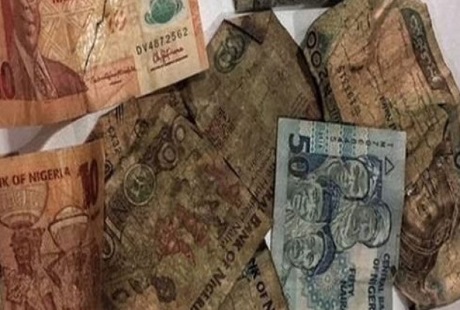Hot Stories
Recent Stories
Dirty Naira Notes: CBN's Deadline Ends Today
Posted by Victor on Mon 02nd Sep, 2019 - tori.ngThe CBN said a large proportion of the N7.9 trillion pieces of naira notes in circulation are dirty, mutilated, unfit for ATMs and over-the-counter payments.

The three-month deadline set by the Central Bank of Nigeria (CBN) for bank customers to deposit dirty naira notes in their banks will elapse at the close of business today.
The CBN had disclosed that a large proportion of the N7.9 trillion pieces of naira notes in circulation are dirty, mutilated and unfit for Automated Teller Machines (ATMs) and over-the-counter payments.
The regulator therefore, directed Nigerians to deposit mutilated Naira notes in any bank branch closer to them.
It said the exercise was part of its efforts to improve the overall quality of the Naira notes in circulation.
Many banks have continued to sensitise their customers on the need to comply with the directive.
In an emailed note to customers, GTBank said: “As part of its efforts to improve the overall quality of the Naira notes in circulation, the CBN has introduced the Clean Note Policy and Banknotes Fitness Guidelines. What does this mean for you?
“If you have in your possession, overused or mutilated Naira notes, you are required by the Central Bank of Nigeria (CBN) Clean Note Policy to deposit such notes at any branch near you on or before Monday, September 2, 2019,” it said.
It explained that overused notes include any Naira note that is now weak to such an extent that it could easily tear at further handling or processing. Mutilated notes include any Naira note that has been partially or permanently damaged, but which clearly still has more than half of its original size together.
“As Nigerians, it is our patriotic and collective responsibility to handle the Naira with care, and as your Bank, we urge you to comply with this directive in order to improve the quality of our national currency,” the bank said.
For many Nigerians, the sorry state of the Naira notes in circulation is appalling and a serious source of worry. The CBN said a large proportion of the N7.9 trillion pieces of naira notes in circulation are dirty, mutilated, unfit for Automated Teller Machines (ATMs) and over-the-counter payments.
The worrisome development is already affecting businesses, especially micro, small and medium enterprises (MSMEs) that need the local currency, especially the lower denominations to transact their businesses. The development has, therefore, prompted the CBN to begin the process of getting the commercial banks and stakeholders in the currency circulation project to implement its clean note policy and banknote fitness guidelines that will involve withdrawal of the dirty notes from circulation.
CBN’s Deputy Governor, Operations, Folashodun Shonubi and Director, Currency Operations Department, Mrs. Pricilla Eleje, spoke of plans to withdraw the dirty notes from circulation at the Clean Note Policy launch in Lagos. The officials said the bank had the obligation of providing adequate supply of clean banknotes to facilitate seamless payment and settlement of transactions by the public, the government and banks.
The CBN had disclosed that a large proportion of the N7.9 trillion pieces of naira notes in circulation are dirty, mutilated and unfit for Automated Teller Machines (ATMs) and over-the-counter payments.
The regulator therefore, directed Nigerians to deposit mutilated Naira notes in any bank branch closer to them.
It said the exercise was part of its efforts to improve the overall quality of the Naira notes in circulation.
Many banks have continued to sensitise their customers on the need to comply with the directive.
In an emailed note to customers, GTBank said: “As part of its efforts to improve the overall quality of the Naira notes in circulation, the CBN has introduced the Clean Note Policy and Banknotes Fitness Guidelines. What does this mean for you?
“If you have in your possession, overused or mutilated Naira notes, you are required by the Central Bank of Nigeria (CBN) Clean Note Policy to deposit such notes at any branch near you on or before Monday, September 2, 2019,” it said.
It explained that overused notes include any Naira note that is now weak to such an extent that it could easily tear at further handling or processing. Mutilated notes include any Naira note that has been partially or permanently damaged, but which clearly still has more than half of its original size together.
“As Nigerians, it is our patriotic and collective responsibility to handle the Naira with care, and as your Bank, we urge you to comply with this directive in order to improve the quality of our national currency,” the bank said.
For many Nigerians, the sorry state of the Naira notes in circulation is appalling and a serious source of worry. The CBN said a large proportion of the N7.9 trillion pieces of naira notes in circulation are dirty, mutilated, unfit for Automated Teller Machines (ATMs) and over-the-counter payments.
The worrisome development is already affecting businesses, especially micro, small and medium enterprises (MSMEs) that need the local currency, especially the lower denominations to transact their businesses. The development has, therefore, prompted the CBN to begin the process of getting the commercial banks and stakeholders in the currency circulation project to implement its clean note policy and banknote fitness guidelines that will involve withdrawal of the dirty notes from circulation.
CBN’s Deputy Governor, Operations, Folashodun Shonubi and Director, Currency Operations Department, Mrs. Pricilla Eleje, spoke of plans to withdraw the dirty notes from circulation at the Clean Note Policy launch in Lagos. The officials said the bank had the obligation of providing adequate supply of clean banknotes to facilitate seamless payment and settlement of transactions by the public, the government and banks.
Top Stories
Popular Stories
Stories from this Category
Recent Stories















































